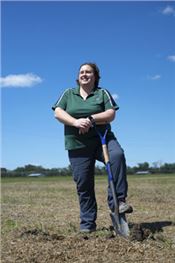Lisa Fultz: The Science Of Soil

Soil microbiologist Lisa Fultz.
Photo by Olivia McClure/LSU AgCenter
BATON ROUGE, LA.
Most people don’t think very much of the dirt they walk on every day. But a whole world exists underfoot – and it can reveal important information for farmers and scientists.
“Soil is really a living ecosystem,” said Lisa Fultz, a soil microbiologist with the LSU AgCenter. “There are more than a billion organisms in a handful of soil. … It is a living system, and we should treat it as such.”
Soil dwellers such as bacteria, fungi, ants, nematodes and earthworms work together to break down organic matter like crop residue and the nutrients it contains. Those nutrients then become available to plants that need them to grow.
Organisms found in the soil offer other benefits.
“When you have this diverse community, they’re all competing for the same resources,” Fultz said. “They kind of help keep plant diseases or organisms that are detrimental to plant growth in check.”
The tiny organisms that live in the ground and their power to influence soil health have fascinated Fultz since she was an undergraduate student. Her environmental science major at Oklahoma State University required her to take an introductory soil science class.
“I was pretty much hooked,” she said.
She went on to earn a master’s degree from Oklahoma State and a doctorate from Texas Tech University, both in soil science.
Fultz always wanted to work in a laboratory, and in her role with the AgCenter, she gets to do that. She also is able to spend a lot of time outdoors. Often, she can be found in a crop field with her shovel, digging up samples and exploring the world of soil.
“It’s really an amazing resource that we don’t spend a lot of time talking about,” she said. ∆